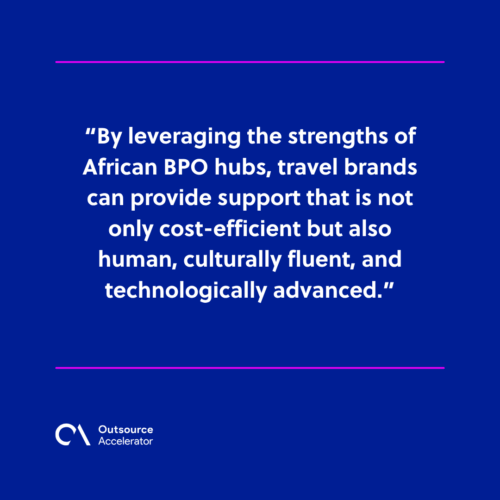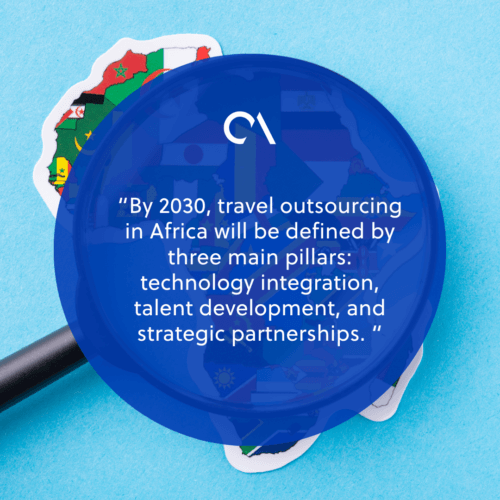Travel BPO 2030: How outsourcing is shaping the next generation of tourism

This article is a submission by CCI Global, written by Christopher Chance, Senior Vice President Operations, East Africa & Major Travel and Leisure Campaigns. He leads customer experience delivery for some of the world’s largest airlines and travel companies, specializing in scalable solutions that optimize operations while elevating the traveler experience.
Outsourcing has long been associated with cost savings and operational efficiency. But in today’s travel and leisure industry, it has evolved into something far more strategic.
It is no longer just about reducing expenses; it is about enhancing customer experiences, delivering multilingual support, and scaling operations globally without compromising quality.
Africa, with its unique combination of talent, technology, and cultural fluency, is emerging as a pivotal hub for the next generation of travel outsourcing.
While our Travel and Leisure portfolio in Africa remains strong, expanding operations into Europe has further strengthened our ability to provide seamless, multilingual service to clients across key markets.
This cross-continental presence ensures consistency, responsiveness, and adaptability in an industry where travelers expect real-time support that feels personal, not scripted.
The transformative era of travel and leisure
The travel and leisure sector is undergoing a period of unprecedented transformation. Rising consumer expectations, rapid digital innovation, and increasingly complex operational demands are reshaping the landscape.
Travelers today want more than just a service; they want experiences that are efficient, culturally aware, and tailored to their needs.
Airlines, hotels, and online travel agencies are no longer evaluated solely on the basics of service delivery; they are measured on how well they anticipate and respond to customer needs in real time.
Outsourcing has emerged as a strategic solution to these evolving demands. By leveraging the strengths of African BPO hubs, travel brands can provide support that is not only cost-efficient but also human, culturally fluent, and technologically advanced.

Africa’s strategic advantage in travel outsourcing
Africa’s rise as a travel BPO destination goes beyond low labor costs. Several key factors make the continent particularly attractive for travel and leisure outsourcing:
1. Multilingual talent and cultural fluency
Africa is home to an extraordinarily diverse linguistic landscape. From English and French to Portuguese, Arabic, and numerous local languages, BPO professionals in Africa are equipped to serve travelers from virtually every corner of the globe.
But language alone is not enough. Cultural empathy, adaptability, and emotional intelligence are just as important in creating positive customer experiences.
A frustrated traveler facing a disrupted flight or a booking error is looking for more than
efficiency; they are looking for reassurance and understanding.
African BPO professionals are trained to provide responses that are thoughtful, empathetic, and contextually appropriate, turning potentially negative interactions into opportunities for loyalty and brand advocacy.
For airlines, hospitality groups, and travel platforms, this combination of multilingual skill and cultural fluency can be a significant differentiator, driving higher customer satisfaction and long-term retention.
2. Cost efficiency without compromising quality
Traditional outsourcing destinations have long emphasized low labor costs as their primary selling point.
Africa offers this advantage but pairs it with highly skilled talent trained to global standards. Countries like Kenya, South Africa, and Egypt combine affordable salaries with education, certification, and experience in delivering world-class customer support.
This combination allows travel brands to scale operations efficiently during peak seasons or high-volume events without compromising on quality. Many African BPOs are also adopting international quality certifications, including ISO standards and airline- specific GDS training.
The result is a premium service experience comparable to nearshore or onshore providers, often at a fraction of the cost.
3. Emerging technology and innovation hubs
The perception that Africa lags behind technologically is outdated. Kenya, South Africa, Nigeria, and other nations have become regional tech powerhouses, driving innovation in AI, automation, analytics, and customer service platforms.
African outsourcing providers are leveraging these capabilities to offer hybrid support models where AI- enabled self-service complements highly trained human agents.
For travel companies, this means faster response times, seamless omnichannel support, and data-driven personalization, all critical in an industry where travelers expect instant, accurate, and meaningful interactions across every touchpoint.
Africa is no longer just a cost-efficient outsourcing destination; it is a place where innovation meets operational excellence.
Market dynamics and growth projections
The African BPO market is experiencing rapid growth. Valued at approximately $8.85 billion in 2025, it is projected to reach $14.75 billion by 2033, reflecting a CAGR of 6.31% (DevelopmentAid, 2025).
South Africa and Kenya currently dominate the sector, combining mature operations with a deep pool of skilled, multilingual talent.
Key growth drivers include:
- Government support: Many African governments actively foster BPO growth through tax incentives, training programs, and infrastructure investment.
- Talent availability: Africa boasts a young, educated workforce increasingly familiar with global customer service standards.
- Proximity and time zone advantages: Alignment with Europe and the Middle East allows for efficient 24/7 service.
In the travel and leisure sector, outsourcing has grown beyond operational necessity.
Airlines, online travel agencies, and hospitality groups increasingly rely on outsourcing partners for high-stakes functions such as loyalty program management, real-time reservations support, and flight disruption handling.
The travel BPO market is projected to grow at a CAGR of 14% from 2025 to 2030 (Allied Market Research, 2025), reflecting strong demand for multilingual, tech-enabled, and culturally aware services.
Case studies: Africa leading the way
Kenya – Silicon Savannah
Nairobi, famously known as Africa’s Silicon Savannah, is emerging as a leading travel BPO hub.
The Kenyan BPO sector is growing at roughly 20% annually, with revenues expected to exceed $254 million by 2024 (Outsource Accelerator, 2024). Kenya’s strengths lie in its highly educated, English-proficient workforce, robust digital infrastructure, and proactive government support for BPO investments.
Travel brands that partner with Kenyan BPOs benefit from:
- High-quality multilingual customer service
- Efficient booking and ticketing support
- Skilled teams capable of handling complex disruptions and sensitive traveler situations
South Africa – Experience and reliability
South Africa has a long-established reputation for delivering premium outsourcing services. Valued at over $3.76 billion, the sector is projected to grow at nearly 19% annually (Cape BPO, 2020).
The country’s workforce demonstrates strong English proficiency, cultural alignment with Western markets, and a proven track record in operational excellence.
Travel brands leveraging South African BPO services enjoy:
- Rapid first-call resolution
- Expertise in loyalty programs and personalized support
- Operational resilience in volatile or high-pressure travel environments
Looking ahead: Travel BPO in 2030
By 2030, travel outsourcing in Africa will be defined by three main pillars: technology integration, talent development, and strategic partnerships.
AI, predictive analytics, and automation will improve efficiency, but the human touch will remain central, especially in emotionally charged customer interactions.
Africa’s strategic advantages will continue to attract global travel brands seeking:
- Scalable multilingual support for diverse markets
- Cost-efficient yet high-quality operations
- Technologically advanced and culturally fluent teams
Emerging hubs such as Nairobi, Cape Town, Cairo, and Lagos are more than alternatives to traditional outsourcing destinations; they are innovative centers shaping the next decade of travel and leisure customer experience.

Why travel brands are paying attention
For airlines and travel companies, outsourcing is no longer just about offloading tasks. It is a strategic component of the brand experience.
Partnering with African BPOs enables travel brands to:
- Deliver seamless, personalized service across multiple channels
- Respond quickly to travelers during disruptions or delays
- Manage complex loyalty programs efficiently
- Scale operations globally without major infrastructure investments
By 2030, travel brands that integrate outsourcing partners effectively, particularly in Africa, will be better positioned to meet the demands of hyper-connected, experience- driven travelers. Africa is no longer just a cost-efficient alternative; it is a strategic partner shaping the future of global travel and leisure outsourcing.







 Independent
Independent




